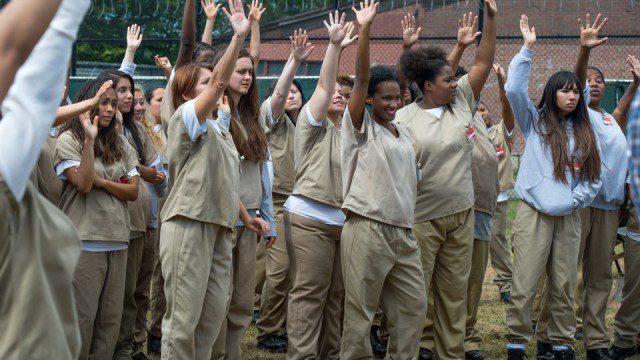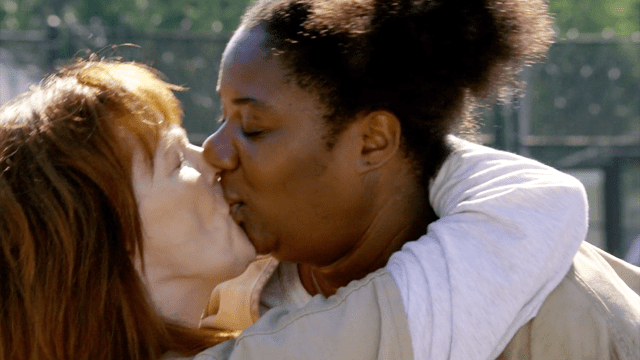Orange Is the New Black doesn’t quite break its streak with “Friends in Low Places” – it’s still better than “We’ll Always Have Baltimore” – but it can be frustrating at times because it doesn’t do right by some of its characters. Piper and Maria are far and away the most interesting people in this episode, but a few others get short shrift, so before we get to the good stuff, let’s talk about what didn’t necessarily work.
For starters, what is Judy King’s purpose on this show? As a celebrity chef turned inmate, she’s obviously she show’s Martha Stewart figure, but her accent and racially questionable past are used to poke fun at Paula Deen. That’s all well and good, but eight episodes in, it doesn’t seem like she has much of a purpose beyond comic relief. And I hate saying that, because I love Blair Brown’s performance, and she genuinely connects with Luschek. And she does get one of my favorite scenes in “Friends,” where she charges Cindy and kisses her square on the mouth so Poussey can get a good picture. It’s funny, and it does a lot of work to show the black inmates that Judy is more than just a racist puppeteer (that’s a good band name; I call dibs), but is funny all it is? Don’t get me wrong, I like Judy – I think I’ve been clear on that – but sometimes I have trouble divining her purpose on the show.
On that note, what is Alex’s story now that Ian is dead? Her downward spiral was already co-opted by Whitehill, so when we find her in the garden smoking crack with Nichols, it’s a sadder scene for Nichols. (I’d argue that it’s far sadder to watch Nichols stealing Red’s stuff, with Red’s knowledge, to trade for drugs.) Alex’s paranoia – and the justification of it – was one of last season’s greatest strengths, but it seems like the show has trouble moving past it. Beyond that, I feel like Muccio is occasionally infantilized, but that’s a long-running complaint.
So “Friends in Low Places” has some minor hiccups, but that’s exactly what they are: minor. What this episode does right, it does really right. It pretty deftly earns sympathy for three of OITNB‘s most unlikable characters; that is, Piper, Maria, and Aleida.
I legitimately like that Aleida has taken over Sohpia’s salon, and you can see how it crushes her that Maria (who is quickly hemorrhaging friends) has made it her base of operations. Aleida and Daya still have a pretty toxic relationship, which isn’t helped by Daya being one of Orange‘s most boring characters, but Aleida is making a concerted effort to be a better person. It’s a testament to the show’s writing, and to Elizabeth Rodriguez’s performance, that it doesn’t ring false. And it’s encouraging that four seasons in, Orange can still pull off a convincing character transformation.
But what works most in this episode is Piper’s swastika, and what it represents. Man, that thing looks ugly, doesn’t it? There’s really nothing worse you can brand on a white person (think back to Inglourious Basterds); it doesn’t hurt nearly as much to call them a cracker or a honky, as evidenced by the fact that I wrote out both words in this review and would never even think about writing the N-word. The brand is really making Piper reconsider herself, and she asks herself one big question: did she deserve it?
Yes and no. I mean, no, obviously, running a used-panty operation doesn’t warrant a swastika being branded on to your arm. But think of the lives she’s ruined out of pure self-interest: Stella is rotting away in max, and Maria has to stay in Litchfield for another few years. In a wonderful, brutal scene, Red helps Piper turn the swastika into a window – with hot tongs, obviously – while espousing what could be Orange Is the New Black‘s motto for season four: “When God gives you a swastika, he opens a window. And then you remember there is no God.”
And even in an episode this busy, OITNB manages to make another commentary on just how twisted the privatized prison system is. Watching the ladies dig the foundation for a new dormitory is fucked up, and reminiscent of the story, possibly apocryphal, that California’s famous Folsom Prison was constructed by inmates who then had to live with it. The inmates at Litchfield have been effectively commoditized, and are now complicit in the imprisonment of others. It’s pretty bleak, dreamy foreman notwithstanding. I mean, we’re looking at a chain gang. In 2016.
A Few Thoughts
- So, Coates has a long, long, long way to go, but he too seems to be reexamining himself. His apology to Doggett wasn’t great, but he meant every word of it. And to her credit, Doggett accepts and seems to mean it when she does so.
- Probably the worst part about Caputo is that he likes Tom Petty, the world’s most boring musician.
- Only getting the barest glimpses of Sophia this season makes it so much worse that we don’t know how she is.
- “I am willing it to be a boy because women are terrifying. If it’s a girl, she will play the fiddle.” Cal Chapman has this fatherhood thing figured out.
- Julius Caesar was displayed pretty prominently next to Poussey’s head – could that be foreshadowing? If you know Shakespeare better than I do (which, statistically, you do) please help me out.
- “Crack is actually good for you in small doses.”


